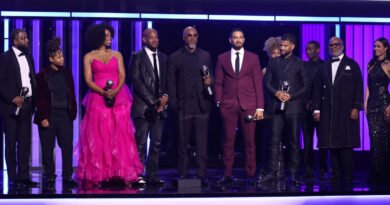
Is Kevin Williamson’s “The Waterfront” Inspired by Real Events?
Kevin Williamson’s life inspired his new Netflix series The Waterfront — but how much of it is rooted in reality when it comes to drug trafficking?
The accomplished screenwriter, director, and producer began his career in the horror genre with Scream and I Know What You Did Last Summer before transitioning to television. Williamson is well-known for crafting stories about small-town life, including hits like Dawson’s Creek and The Vampire Diaries.
Throughout his career, Williamson has reflected on how his upbringing in North Carolina shaped his work. For example, James Van Der Beek’s character Dawson in Dawson’s Creek shares Williamson’s passion for film, while Katie Holmes’ Joey has a father in prison for drug-related charges.
“Her dad is in prison for conspiracy to traffic marijuana in excess of 20,000 pounds,” Williamson shared with TV Insider in June. “That was my dad’s charge. That’s what led to his imprisonment.”
Williamson also mentioned that I Know What You Did Last Summer contained a reference to his background, stating, “My dad was the fisherman in I Know What You Did Last Summer,” he notes. “He has been an immense help in my career.”
In The Waterfront, Williamson found an opportunity to delve deeper into his father’s legal troubles. This crime drama, which debuted on Thursday, June 19, tells the story of the fictional Buckley family, who have dominated the North Carolina town of Havenport for generations. Their quest to maintain their fishing empire ultimately leads them down a more perilous path.
“This represents another side of me. This is the darker side,” Williamson remarked to TV Insider. “While Dawson’s Creek focused on coming-of-age themes and young love, I’ve always wanted to tell this story, but I wanted to wait until my dad had passed. I told him, ‘When you die, I’m telling your story.’ He was always like, ‘OK.’”
Sadly, Williamson’s father passed away before The Waterfront premiered. “He said, ‘Oh, I wish you had told the story sooner. I won’t be around for it,’” Williamson remembered. “He didn’t make it, but he was so close, and he would have appreciated it.”
While Williamson’s father’s life inspired the backdrop for The Waterfront, the writer emphasized that the series takes many creative liberties, stating, “He’s not the show.”
Continue reading for a breakdown of what’s fact and what’s fiction in Williamson’s The Waterfront:
What Actually Happened?
“Back in the ’80s, my dad found himself in some trouble,” Williamson told Entertainment Weekly in June. “He was a fisherman and got involved with individuals who paid him to transport [drugs] on his fishing boat.”
Williamson confirmed that his father encountered legal issues.
“At that time, everything was beginning to shift, and the fishing industry in America, especially on the Eastern Seaboard, was declining,” he continued. “He was a good man who made some poor choices and ultimately served time for it during my college years.”
What Is Different?
In an interview with TV Insider, it was noted that Williamson’s family never ran a restaurant or served as the backbone of a coastal North Carolina community.
While Williamson’s father was involved in marijuana trafficking, the show revolves around the opium trade. (Wade Williamson, who passed away in 2020, was arrested in the 1980s for his involvement in an elaborate smuggling operation that transported millions of dollars worth of drugs using fishing boats. He ultimately faced charges for conspiring to traffic over 20,000 pounds of marijuana.)
What Did the Cast Know About the Show’s Origins?
“The Waterfront was a unique blend of magic,” Danielle Campbell, who plays Peyton, shared with Us Weekly. “The setting is where he grew up, and it revolves around his personal narrative. Such instances of a story being based on real events are quite rare in film and television. This isn’t a storyline you would typically associate with reality.”



